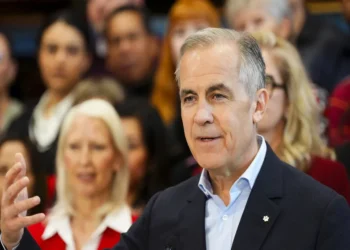The ad from the powerful pro-Israel lobbying group intensifies pressure on the Trump administration, demanding the full dismantling of Iran’s nuclear program and featuring previous comments from Trump declaring that Tehran must never be allowed to acquire a nuclear weapon. It is airing on Fox News and across social media, according to the lobbying giant.
The media buy reflects mounting anxiety within pro-Israel circles and among some members of Congress over the direction of the Iran nuclear talks. The push for a new diplomatic agreement with Iran is reviving old anxieties, with opponents warning it risks repeating what they view as the fundamental flaws of the 2015 deal under then-President Barack Obama, giving Iran economic breathing room without long-term guarantees on nuclear restrictions.
Iran is enriching uranium to near weapons-grade levels and has enough material for several bombs, according to the International Atomic Energy Agency, though no weaponization has been detected. Tehran claims its program is peaceful but has threatened fierce retaliation and a possible withdrawal from the nonproliferation treaty if its nuclear sites are attacked.
In 2018, Trump announced the United States would withdraw from the 2015 Iran nuclear deal, criticizing it as “a horrible one-sided deal that should have never, ever been made.” He slammed the deal as flawed, saying it paved the way for Tehran to eventually build nuclear weapons, ignored its missile program, and did little to restrain its support for terrorism. He also criticized the sanctions relief, arguing it handed Iran billions without lasting safeguards.
Negotiations between Washington and Tehran are poised to resume for a fourth round shortly.
The U.S. and Iranian delegations each outlined proposals and debated various issues on Saturday, but no agreements were reached. Negotiators remain divided over key issues like uranium enrichment levels, sanctions relief, and verification measures.
“I think we are all just waiting to see exactly what plays out, but there’s definitely concerns on our side; we don’t want to see anything that remotely resembles an Obama-era deal,” said a pro-Israel lobbyist, speaking on the condition of anonymity to reflect candidly on the situation.
Israeli Prime Minister Benjamin Netanyahu on Sunday urged the complete dismantling of Iran’s nuclear program, warning against any concessions as the U.S.-Iran talks appeared to gain momentum following a third round of indirect negotiations in Oman.
Warning that “a bad deal is worse than no deal,” Netanyahu said that the only acceptable outcome would mirror Libya’s 2003 agreement, which required the complete dismantling of its nuclear program, both military and civilian, a model he insisted must now be applied to Iran.
Sen. Mike Rounds (R-SD) expressed deep unease over the talks with Iran, questioning their ability to prevent Tehran from developing a nuclear arsenal, though he declined to go into detail.
“I’m very concerned with regard to any negotiations with Iran, and whether or not they actually could stop Iran from obtaining a nuclear weapon, and what that is defined as,” Rounds said, speaking to reporters on Tuesday. “So, we have concerns about it, but I really can’t discuss the specifics.”
Sen. Kevin Cramer (R-ND) said he was initially concerned by early comments from U.S. negotiators that suggested a troubling lack of technical understanding about Iran’s nuclear capabilities. However, he said he grew more comfortable after hearing directly from Trump and Steve Witkoff, the White House special envoy to the Middle East.
Trump has framed the goal of the negotiations as stopping Iran from acquiring nuclear weapons, but his administration officials have offered conflicting signals about how that should be achieved.
“I got comfortable when the president was clear and when Steve Witkoff was clear and said, ‘no, we cannot allow them to have a nuclear weapon, period. There’s no condition that allows for that,” Cramer said, speaking to the Washington Examiner. “I was concerned for a while, but the clarification from both the president and Witkoff were very helpful.”
Several Senate Republicans, while declining to comment publicly, signaled they are willing to give Trump and his team room to pursue a potential agreement despite their deep mistrust of the Iranian regime.
Trump has framed the goal of the negotiations as stopping Iran from acquiring nuclear weapons, but his administration officials have offered conflicting signals about how that should be achieved.
FETTERMAN CALLS FOR US STRIKES ON IRAN’S NUCLEAR SITES
Last week, the New York Times reported that Israel had been preparing to strike Iranian nuclear sites as early as next month, but Trump discouraged the move in hopes of reaching a diplomatic agreement with Tehran.
In an interview with Time, Trump said he didn’t block Israel’s plans outright but admitted he “didn’t make it comfortable” for them, expressing hope a deal could be reached without military action. Still, he warned that if negotiations fail, force could be necessary to prevent Iran from developing a nuclear weapon.
The next nuclear negotiations are scheduled for May 3 in Muscat, Oman, in an effort to address key issues such as Iran’s uranium enrichment levels and the lifting of U.S. sanctions. While both sides have reported progress in previous discussions, significant differences remain.















